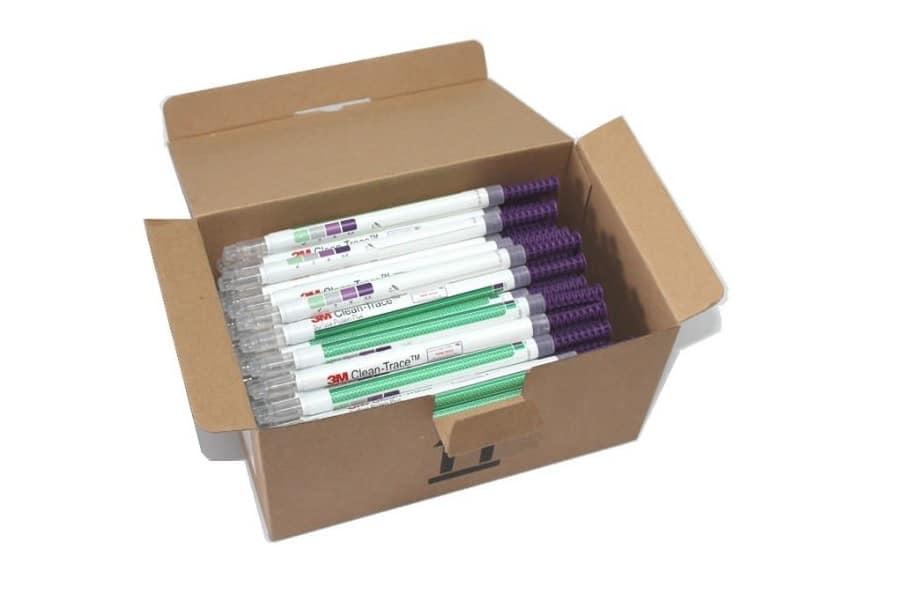What Is a Protein Residue Test?
A protein residue test is a chemical test used to detect levels of protein on a processed load that cannot be seen by visual inspection.
The test is looking for a certain type of protein which is found in blood.
If an instrument is not clean it cannot be sterilised.
Dirty instruments that are processed through a sterilisation cycle will not be sterile at the end of the decontamination process.
A record must be kept of each protein residue test as evidence.
How can I tell if the test has failed?
All test products will have a different method to show that the test has failed. However, it is indicated by a colour change. The manufacturer/supplier of the product will provide instructions on how to read the results. Often a dark colour change indicates a failed result. However, always confirm with the manufacturer’s instructions.
Reaction times: Each product will have a specific reaction time. It is important that the results are only read at this exact time. A test may initially indicate a pass result; however, it may grow to become a failed result as the reaction continues. A reaction is continuous, and therefore you will only get an accurate reading after a certain amount of time. Refer to the manufacturer’s instructions for the reaction time.
Proof of the test: The test should be recorded, however, do not store the test product. Because the protein residue test is a chemical reaction over a long period of time, all results will become a failed results.
What do I do if the test fails?
Should the test fail, a re-test should be performed. If the test fails a second time, a diagnosis of both the method of cleaning and the method of testing is required.
Possible fail reasons for a protein residue test:
- Detergent residue may present a false positive. This is usually caused when the detergent used has been changed by the level of dosing has not.
- Instruments handled excessively during testing may cause a false positive. Gloves should always be worn when performing a protein residue test.
- In some cases, it may be that the machine under test is not working correctly, and an engineer may be required to diagnose further.
- Check that the test product used is within the expiry date provided.
- Check what was used to moisten the swab. Tap water may present a false positive result.
I have performed the test on a soiled instrument, and the test has passed. Why is this?
The protein residue test is only looking for a protein that is found in blood. If the soiled instrument does not possess this type of protein, the test will pass.
Below is a good activity that will demonstrate this.
Activity:
Items required: 2 protein residue tests and milk
Method: with one of the protein residue tests, swirl it in milk, and with the other, swab an area that is visibly dirty e.g. a path in front of the premises. The test that has the milk on it will always fail as milk holds the same protein that is found in blood, whereas the test that has dirt on it should pass.
What do I perform the test on, the machine or the instruments?
The protein residue test is to be performed on the instruments after the cleaning stage of the decontamination cycle.
The user is testing to see if the instruments have any protein residue after they have been cleaned. This test is mandatory to be performed after instruments have been performed in the ultrasonic bath or in the washer disinfector.
If the practice has both an ultrasonic bath and washer disinfector, this test must be performed on instruments that have been processed in the ultrasonic bath and in the washer disinfector.
How often do I perform the test?
The protein residue test is a weekly requirement. The test is to be performed once a week on the instruments processed in both the ultrasonic bath and the washer disinfector.
Is incubation required?
This answer will vary dependent on the product used to perform the protein residue test. Some products do recommend the use of incubation to shorten the reaction time or increase the sensitivity of the test; however, it is just a recommendation and not a requirement. Always check with the manufacturer/supplier prior to use.
Tips
Things you shouldn’t do when testing:
- Use tap water to moisten the swab
- Swab anything other than the instruments, including test soil strips e.g. Wash Check.
- Use out of date tests
- Use a test that has previously been used
- Contaminate the test. Always wear gloves to ensure the test is not contaminated
- Ignore the result if it reads as a fail
- Continue to use a swab that has touched any other surface
- Over moisten the swab as this may read as an invalid result
Always Follow the Manufacturer’s instructions.
purchasing protein pens
Agilio Dental Shop offers both Cleantrace Protein Pens, and Medicheck Protein Pens. Both are suitable for use within a Dental setting, and available in a variety of pack sizes (25, 50 and 100)
Agilio Dental
Learn more about how our technology can help to grow your dental business.

